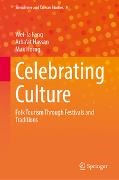Mehr lesen
This book provides a comprehensive exploration of festival-making activities, their cultural significance, and their impact on tourism and community identity. It delves into the evolution of festivals, from traditional folk celebrations to modern, tourism-driven events, offering insights into how these festivities shape cultural heritage, economic development, and social cohesion in an increasingly globalized world.
A distinguishing feature of this book is its use of integrated references, illustrations, diagrams, and case studies, making complex theories more accessible and engaging. Richly illustrated with vibrant images of festivals from around the world, it not only serves as an academic resource but also as a visual celebration of diverse cultural traditions.
This book bridges theoretical concepts with practical implementation, making it a valuable resource for researchers, postgraduate students, and professionals in various fields, including tourism management, anthropology, cultural and creative industries, event planning, and folklore studies. The book is also essential for policymakers, cultural heritage advocates, and business professionals who seek to leverage festivals as a means of economic and cultural development.
Inhaltsverzeichnis
Part 1: Fundamentals.- Chapter 1: Introduction to Festivals.- Chapter 2: Festival Psychology.- Chapter 3: Festival Society, Culture, and Economy.- Chapter 4: From Ritual to Celebration: Folk Festivals and Festival-Making.- Part 2: Practical Applications. Chapter 5: Festivals, Folklore, and Tourism: Methods, Contexts, and Trends.- Chapter 6: Festival Tourism Planning: Integrating Cultural Authenticity and Strategic Innovation.- Chapter 7: Operation and Management of Festival and Tourism Activities.- Chapter 8: Evaluation and Impact of Festival Tourism.
Über den Autor / die Autorin
Wei-Ta Fang
is a Distinguished Professor and Director of the Graduate Institute of Environmental Education at National Taiwan Normal University, as well as President of the Society of Wetland Scientists (SWS), Asia Chapter, and the Taiwan Wetland Society. He holds a Ph.D. in Ecosystem Science and Management from Texas A&M University. An environmental educator and the first research fellow in Asia certified as a Professional Wetland Scientist (PWS), Dr. Fang has received the SWS President’s Service Award (2011, 2017) and the SWS Doug Wilcox Award (2015). He has served as Associate Editor for
Wetlands
(Springer) since 2012.
The Living Environmental Education
is his third English-language book, following
Tourism in Emerging Economies
and
Envisioning Environmental Literacy: Action and Outreach
(Springer, 2020).
Arba’at Hassan
is a Senior Lecturer at the Kota Marudu Learning Centre of Open University Malaysia. With a background in education and community development, he has been actively involved in promoting cultural heritage and local tourism in rural Sabah. His research interests include indigenous knowledge systems, folk traditions, and the role of education in sustaining cultural identity. Arba’at has collaborated with local communities and NGOs to document and revitalize traditional festivals, and he regularly contributes to academic and public discourse on cultural sustainability in Southeast Asia.
Max Horng
is a professional photographer and the Director of Angel Wings House, a creative studio based in Taipei, Taiwan. With over a decade of experience in visual storytelling, Max specializes in capturing cultural events, festivals, and community life through photography and film. His work has been featured in exhibitions, documentaries, and educational projects across Asia. Passionate about preserving intangible heritage through visual media, Max brings a unique artistic perspective to the documentation of folk traditions and their transformation in the modern world.
Zusammenfassung
This book provides a comprehensive exploration of festival-making activities, their cultural significance, and their impact on tourism and community identity. It delves into the evolution of festivals, from traditional folk celebrations to modern, tourism-driven events, offering insights into how these festivities shape cultural heritage, economic development, and social cohesion in an increasingly globalized world.
A distinguishing feature of this book is its use of integrated references, illustrations, diagrams, and case studies, making complex theories more accessible and engaging. Richly illustrated with vibrant images of festivals from around the world, it not only serves as an academic resource but also as a visual celebration of diverse cultural traditions.
This book bridges theoretical concepts with practical implementation, making it a valuable resource for researchers, postgraduate students, and professionals in various fields, including tourism management, anthropology, cultural and creative industries, event planning, and folklore studies. The book is also essential for policymakers, cultural heritage advocates, and business professionals who seek to leverage festivals as a means of economic and cultural development.

